According to the NCPD, youth, who form 35% of the Kenyan population, have the highest unemployment rate of 67%. With limited formal job opportunities and increasing economic pressures, many young people are compelled to explore alternative means of livelihood, including entrepreneurship.
To better understand the perspectives of Kenya’s youth on employment and entrepreneurship, GeoPoll conducted a survey capturing insights into their aspirations, challenges, and perceived opportunities. This report highlights the key findings from the survey and sheds light on the current state of youth employment, their attitudes toward entrepreneurship, and the structural barriers they face in achieving economic stability.
Demographic Overview
The survey gathered feedback from a varied group of young people in Kenya. The participants ranged from 18-35 years old, with the largest share being between 25-35 years old (64%), and comprised 63% male and 37% female. A significant number held college degrees (70%).
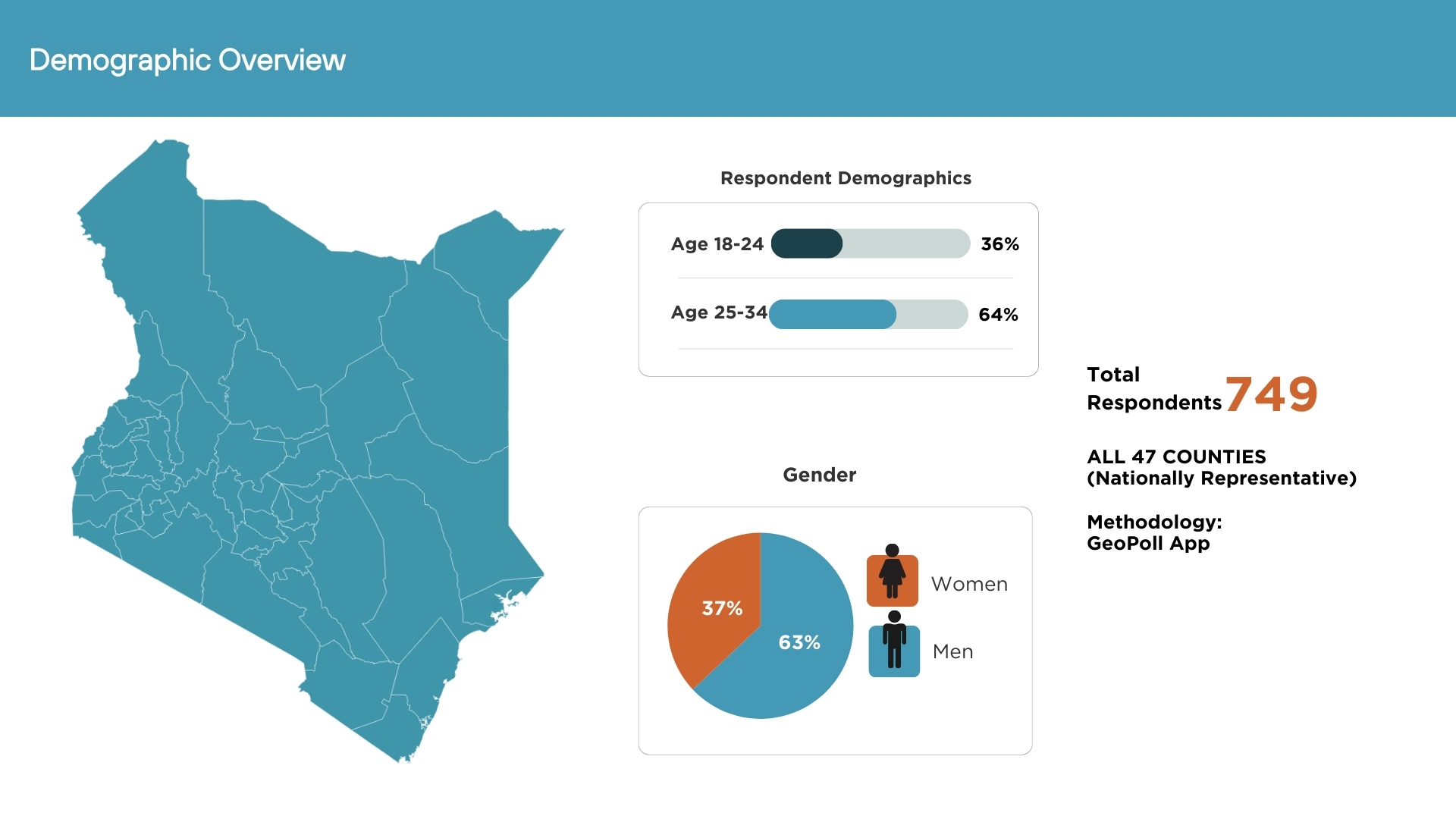
Household Income
When asked about their present household income, the largest group, at 44%, makes less than Kes. 30,000. This is followed by 20% who earn between Kes. 30,000 and Kes. 50,000, and then 17% who have an income ranging from Kes. 50,000 to Kes. 80,000. Only 6% said they earn over Kes. 150,000.
Key Findings
Employment Status
The findings revealed a mixed picture: 38% of respondents identified as unemployed, highlighting the ongoing struggle for stable job opportunities. Conversely, 37% reported being employed full-time, while 26% indicated part-time employment, reflecting the diverse ways young people are participating in the workforce.
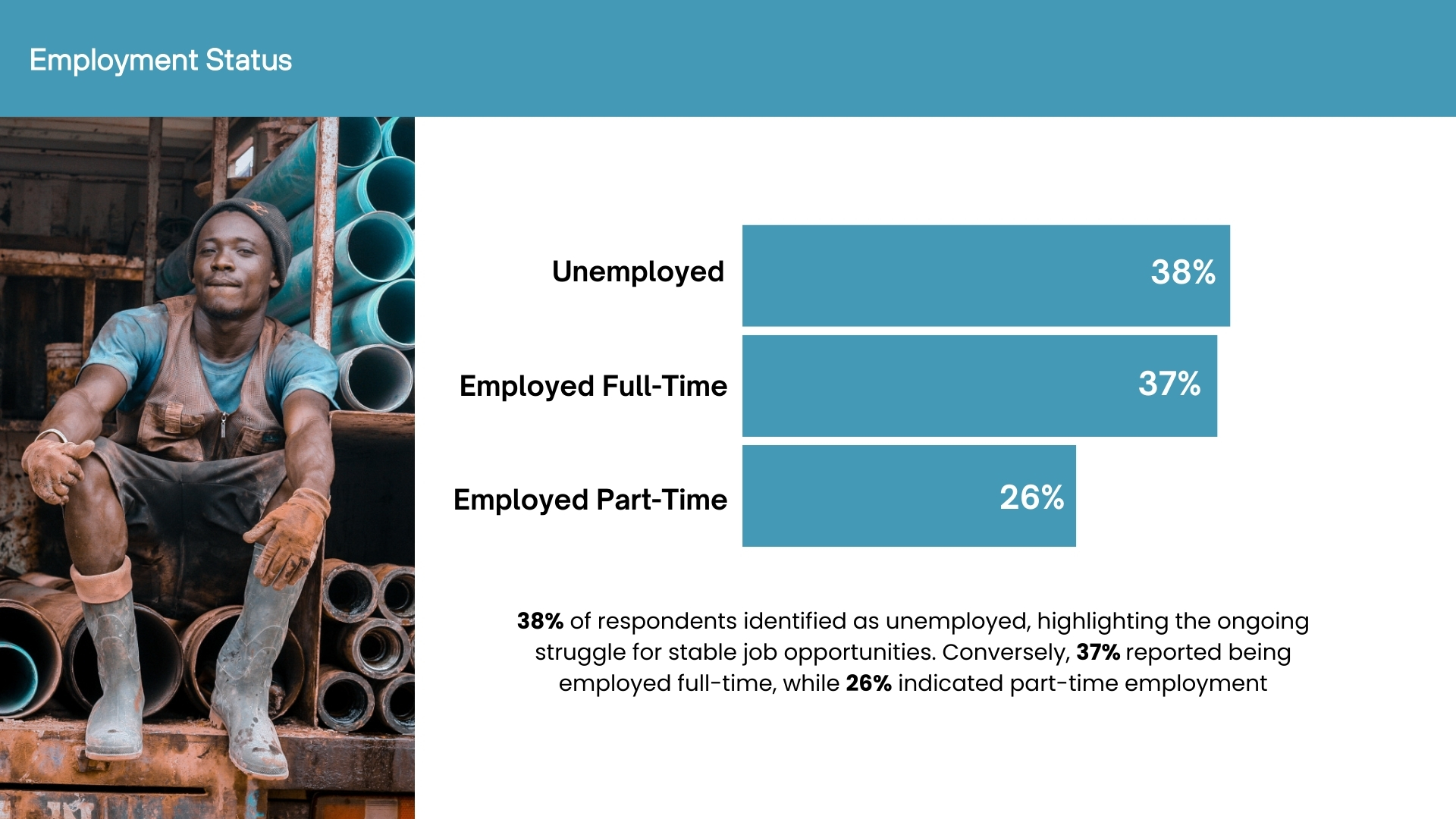
Top employment sectors in Kenya
Among those surveyed, 19% identified themselves as working in the Information and Communications Technology (ICT) sector, making it the largest group. Kenya is renowned for technology leadership across the continent. A lot of Kenyan youth work in the digital economy, including remote work, freelancing, and content creation, which made the government enforce the Digital Service Tax.
The agribusiness sector accounted for 14% of employment. Additionally, another 14% of respondents reported being involved in the sale of goods and services, particularly within the supermarket industry. The hotel and tourism sector comprised 12% of the workforce, while 8% were employed in both finance and insurance. The manufacturing sector employed 7% of workers, and transportation accounted for 5% of employment. The construction industry, , which the government has been pushing through the Affordable Housing Program, represented 3% of those employed.
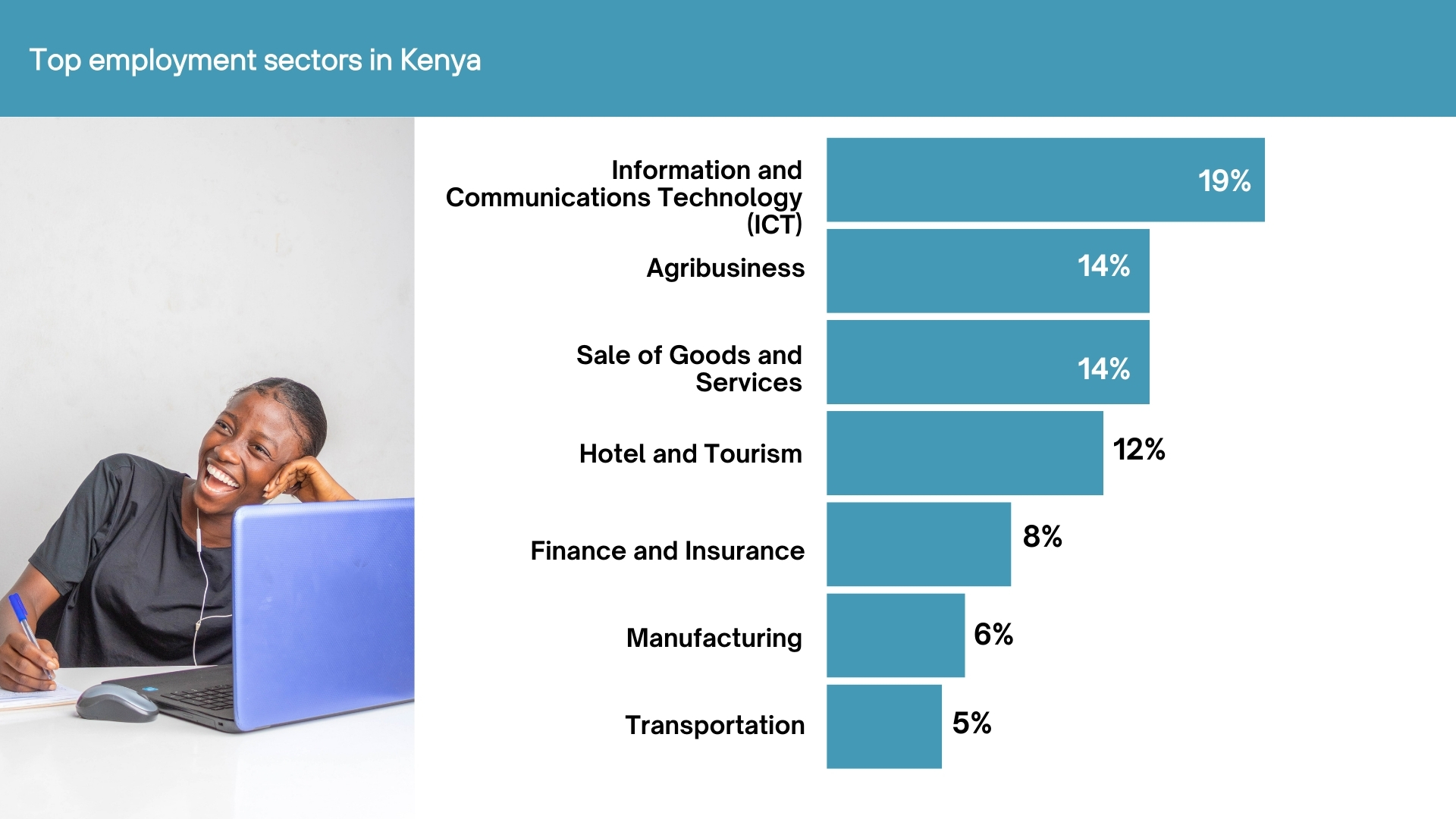
Side Hustles
Despite the variations in employment status, the majority of respondents (71 %) reported having side hustles—small-scale entrepreneurial activities that supplement their income. This highlights the resilience and adaptability of Kenya’s youth, who are leveraging their skills and creativity to navigate an unpredictable economic environment.

Seeking for Employment
Among the individuals identified as unemployed, which constitutes 37% of the surveyed population, a significant 91% are actively seeking employment. Within this group, 33% have reported that their job search has extended over the past two years. An additional 26% have been searching for more than one year but less than two years, while 24% have been in pursuit of employment for a duration of six months to one year. Lastly, 18% have begun their search within the last six months.
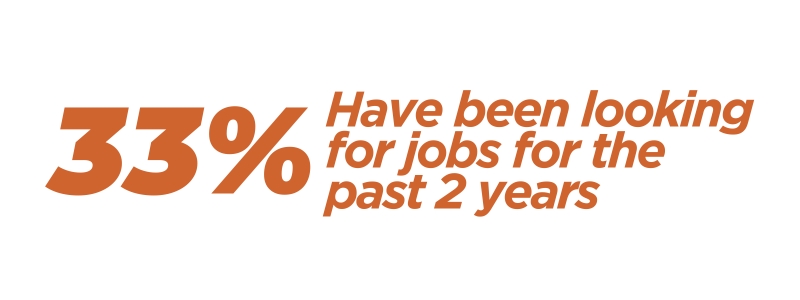
Unemployment challenges
When asked about some of the challenges they faced as being unemployed, a staggering 80% of respondents cited a lack of job opportunities as the primary hurdle. Additionally, 42% pointed to the pervasive issue of nepotism and cronysm, expressing frustration over the necessity of personal connections to secure employment. Insufficient networking opportunities were highlighted by 39% of participants, while 34% underscored inadequate support from government and institutions as a barrier. Other significant challenges include lack of work experience (32%), limited access to career guidance (17%), and skills mismatches (17%). Mental health struggles and low morale also emerged, with 6% noting the emotional toll of prolonged unemployment.
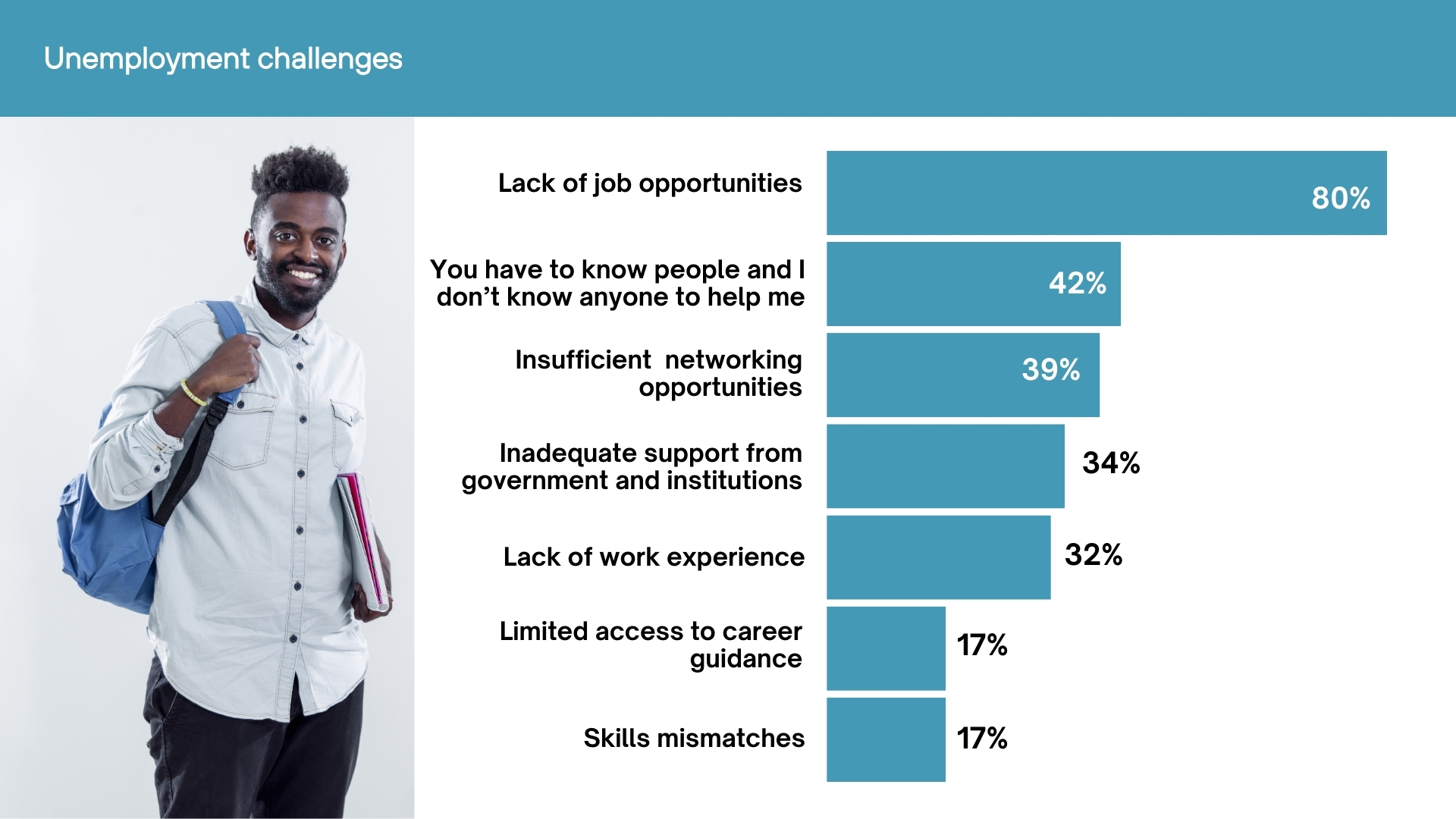
Entrepreneurship
The survey revealed a strong entrepreneurial spirit among Kenyan youth, with an overwhelming 87% expressing interest in starting their own businesses. This highlights a growing inclination toward self-employment as a pathway to economic independence and opportunity.
Furthermore, the survey found that 56% of respondents prefer running their businesses full-time, while 39% expressed interest in pursuing entrepreneurship on a part-time basis. Notably, 6% remained uncertain about their preferred approach.
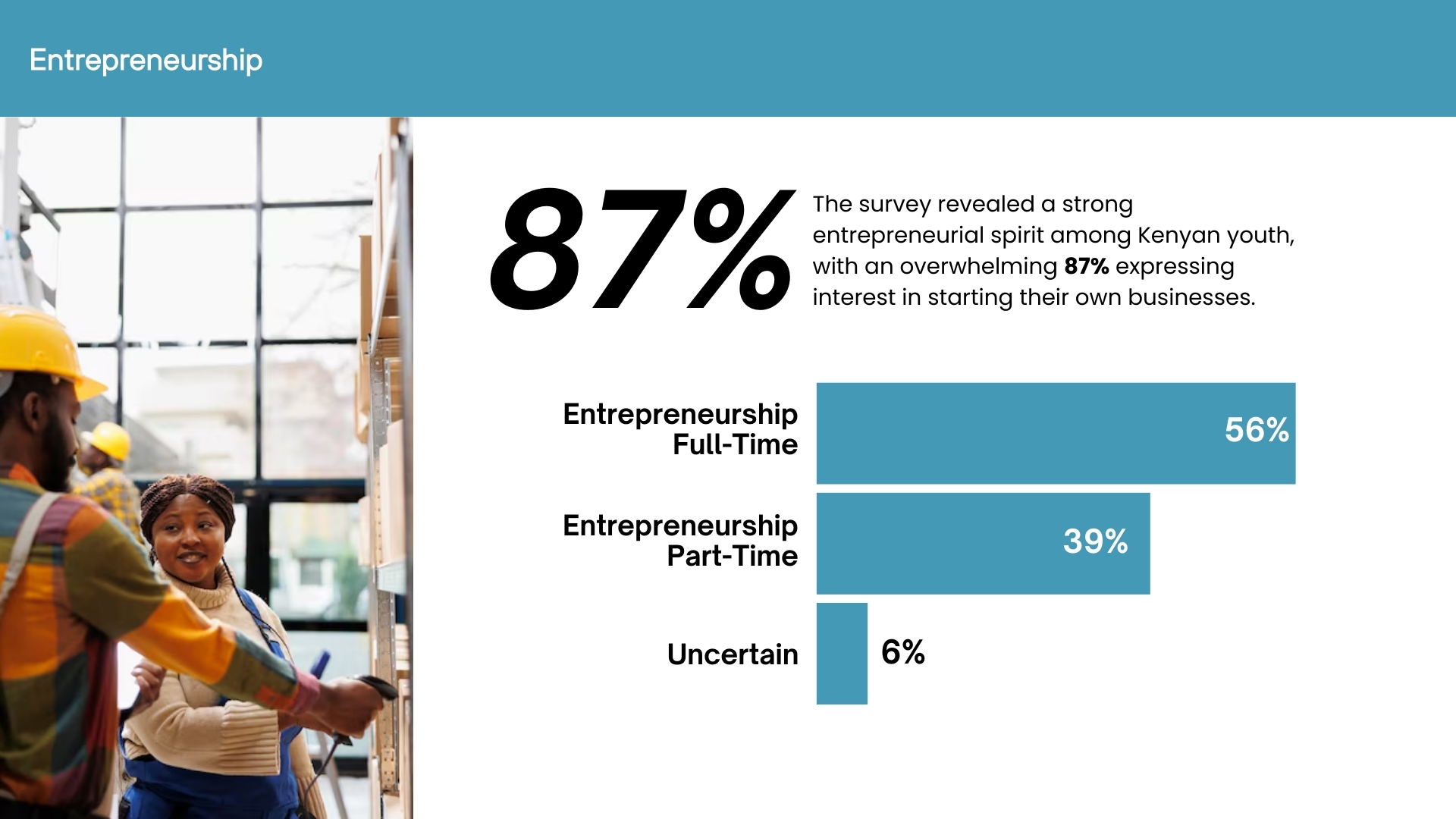
Entrepreneurship Sector
When it comes to sectors of interest, retail and trade emerged as the most desired field, attracting 33% of the respondents. Agriculture followed closely with 27%, reflecting the sector’s longstanding significance in Kenya’s economy. Technology ranked third at 21%, highlighting the growing appeal of innovation and digital solutions among the youth. These preferences underscore a blend of traditional and modern entrepreneurial pursuits shaped by both market opportunities and emerging trends.
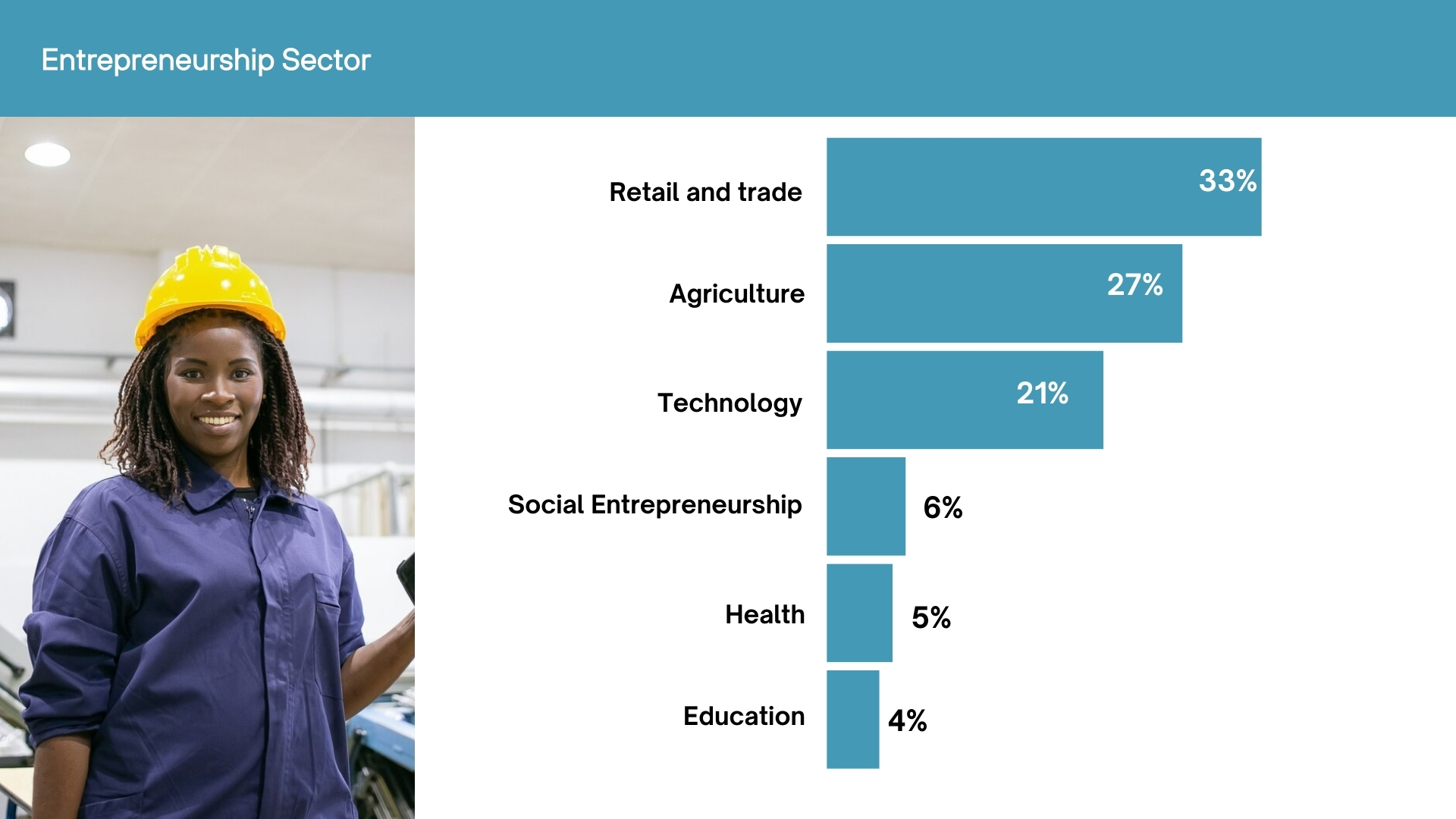
Entrepreneurship Barrier
Starting a business in Kenya presents several challenges for youth. A significant 72% of respondents cited lack of access to capital as the primary obstacle, limiting their ability to realize their ideas. Additionally, 9% noted the absence of support systems or mentors, while 7% mentioned market competition as a barrier to sustaining their businesses.
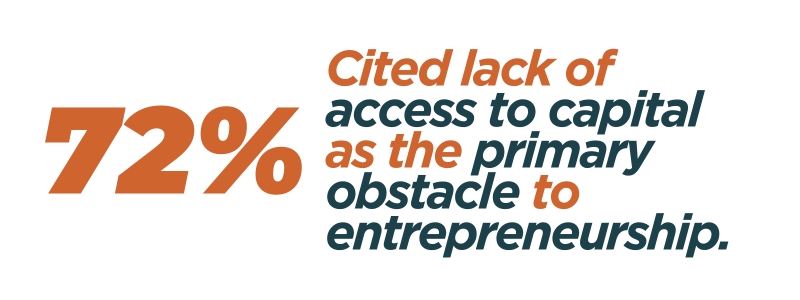 Furthermore, 6% identified a lack of business knowledge and skills, pointing to deficiencies in education and training. Also, 6% expressed uncertainty about starting their ventures, whether due to unclear business ideas or being overwhelmed by too many options. These findings underscore the need for improved access to funding, mentorship, and capacity-building initiatives for young entrepreneurs in Kenya.
Furthermore, 6% identified a lack of business knowledge and skills, pointing to deficiencies in education and training. Also, 6% expressed uncertainty about starting their ventures, whether due to unclear business ideas or being overwhelmed by too many options. These findings underscore the need for improved access to funding, mentorship, and capacity-building initiatives for young entrepreneurs in Kenya.
Opportunities for young people
A significant portion of the youth in Kenya (60%) holds the belief that ample opportunities exist for young individuals interested in entrepreneurship. However, 33% of the respondents express the contrary view, indicating that they believe there are insufficient opportunities available. Additionally, 7% of the youth are uncertain and do not have a clear opinion on the matter.
Support
Financial support (grants and loans) (82%) – is the most sought-after form of assistance for aspiring young entrepreneurs, with 82% of respondents identifying it as crucial to starting their businesses. This highlights the significant role of access to capital in empowering youth to overcome financial barriers and kickstart their ventures. Mentorship and guidance (51%) – The survey also found that mentorship and guidance are highly valued by young entrepreneurs, with 51% of respondents identifying them as essential forms of support.
Skill training programs (51%) – The survey further revealed that skill training programs are a key need for young entrepreneurs, with 51% of respondents highlighting their importance. These programs play a crucial role in equipping youth with practical knowledge and expertise to manage and grow their businesses effectively.
Government Policies and incentives (45%) – 45% of respondents identified Government policies and incentives as an important factor in starting a business. This highlights the need for favorable policies, such as tax incentives, subsidies, and business-friendly regulations, which can help reduce barriers to entry for young entrepreneurs.
Networking events (39%) – Networking events were recognized as an essential support mechanism, with 39% of respondents emphasizing their importance. These events provide young entrepreneurs with valuable opportunities to connect with potential partners, investors, and industry experts, fostering collaboration and business growth.
Training Programs
The survey revealed that 54% of respondents have engaged in entrepreneurial or business training programs offered by either governmental or non-governmental organizations. Among those who participated, 34% reported that these programs moderately enhanced their entrepreneurial and business skills. Additionally, 29% noted a slight improvement, while 26% experienced a significant enhancement in their skills. Conversely, 10% of participants indicated that they saw no improvement from the training received.
Methodology/About this Survey
This Exclusive Survey was run via the GeoPoll mobile application between the 10th and 15th of November 2024 in Kenya. The sample size was 749, composed of random app users between 18 and 35. Since the survey was randomly distributed, the results are slightly skewed towards younger respondents.
Please get in touch with us to get more details about our capabilities, explore more on the theme of youth and employment, or other topics in Africa, Asia, and Latin America.
